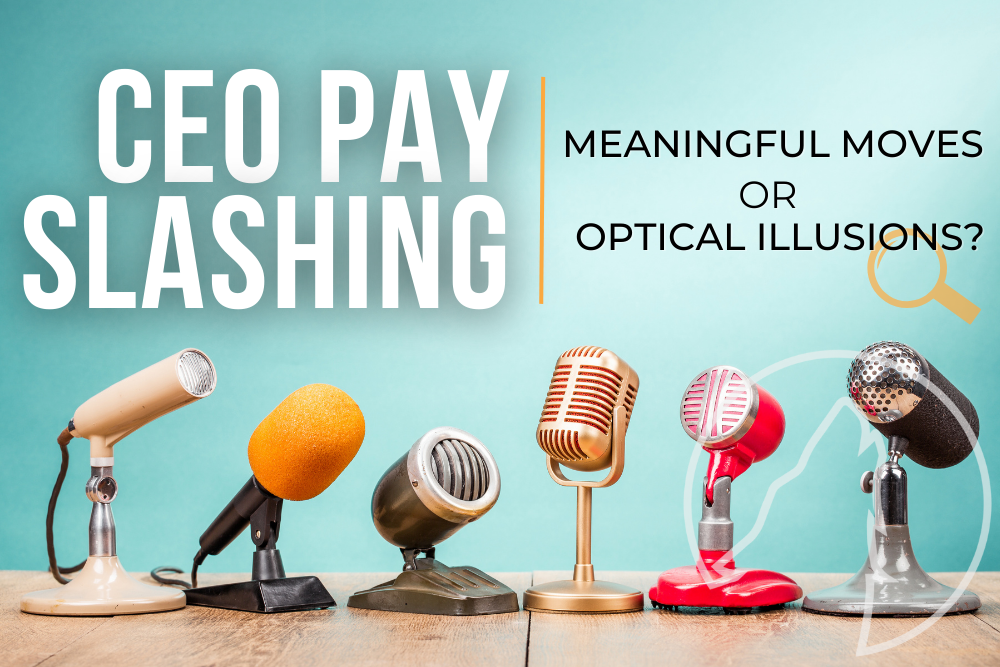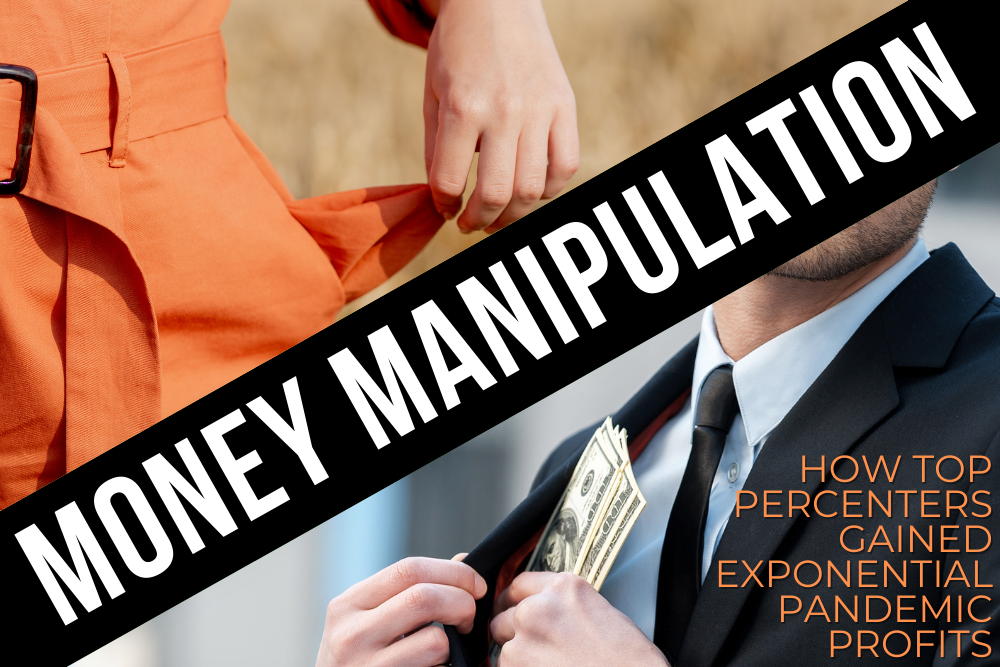
Voluntary CEO pay cuts: genuine concern or PR moves? Honestly, either way, we don’t care. Because these CEOs at least are reading the air, and often good deeds are in some ways at least partly self-serving. What about the other obscenely high-earning CEOs? Can they even see the millions of lower-ranked employees getting laid off from their lofty towers that hold them aloof from reality?
If you’re not aware, Tim Cook, Apple’s CEO took a 40 million dollar pay cut to avoid having to lay people off.
Seriously.. good for him. That’s great. I’m glad that hundreds of people didn’t need to start looking for work.
But I wonder if a Hundred Million dollar salary might be a part of the problem to begin with ?
– Caleb Sullivan, Recruiter and Writer, LinkedIn
Valid question, Caleb. We have been wondering that ourselves.
In this article:
- Separating Leaders from Schemers
- Playing Games with the Numbers
- The
UnProfitable Pandemic - Have Some Decency!
- Excessive CEO Pay Causes Societal Detriments
- To Get on Track, First Get Back to the Path
Separating Leaders from Schemers
Apple CEO Tim Cook had his pay for this year reduced by a whopping 40% as a strategic move to avoid layoffs for the company. Although Cook was one of the first major names to hit the headlines this year, this past week has seen a couple more top-earning names join him in taking (or receiving? ? ) pay cuts. After a harsh 2022 business year, financial institutions Goldman Sachs and Morgan Stanley also have also cut a chunk of dough from David Solomon’s and James Gorman’s compensation, respectively.
On LinkedIn, some lauded Cook for his leadership while others stand firmly unimpressed. One thing that most seem to be agreeing upon is that it’s a great first step, which is true. We’re betting the same split opinions can be expected for these CEOs and the others sure to follow. Those who don’t may find that their “let them eat cake” attitude could land them in hot water in an age where brand reputation and values matter more than ever.
Today’s troubled economy, frequent headlines about unethical practices, and online reviews accessible by a literal world of customers have made having a good brand reputation a non-negotiable selling point. On top of that, the upcoming generations are quick to call out corporate BS, both as consumers and as potential employees.
So at a time when we are seeing record layoffs starting in 2020 (and this was before this year, from Sept. ‘22) AND when you consider how worker value of pay has stagnated since 1973 (Economy Policy Institute), we want to know: how is it that the CEO to worker wage ratio is at a record high, having raised 1,460% since 1978?
Not only that–while the average CEO salary did an epic rise since 2020, worker wages fell 2.4%. That’s… not okay. What’s going on?
Playing Games with the Numbers
Not that long ago in the 1970s, CEOs of major U.S. companies earned just 27 times more than the typical worker. From there, the 1980s started to see CEO compensation grow steadily. The 1900s is when it really started to get out of hand with the Congressional allowance of corporations to use executive pay as a tax write off if it were over $1 million.
However, the stipulation of this allowance relied on proof that pay is based on some measure of performance. Essentially, share prices doing well for the holders, and a beginning strategy of being paid with stock options. This means stock value is the main income for CEOs, and therefore, these company heads do whatever is necessary to keep these stock values protected above all else.
For example: at Boeing, CEO David Calhoun voluntarily took only $269,231 of the $1.4 million his salary entitled him to in 2020. Super admirable, right? Well, because of stock awards, his actual income that year was more than $21 million, and still was followed by laying off more than 30,000 employees.
The UnProfitable Pandemic
We get it. Prices for products and services are being raised because of the lack of customer spending and higher spend on production, and costs do need to be covered. But if that’s the case, then why are the rich still getting richer? Greed is rampant, running amok company bigwigs while the laborers who make it possible are being left to do more work for less pay.
With recent average earnings of CEOs being 347 to the average worker’s 1, it kinda makes you wonder what these people do all day to turn profits that would dizzy any human with a decent head on their shoulders. Are CEOs really adding 347 times as much value as those with boots on the ground, especially during the pandemic?
They are avoiding answering the tough questions. Marketplace reached out to 12 companies to ask if any executives would be open to discussing how they calculate pay cuts. Crickets. Not a single one accepted, and some even ignored the request to be transparent altogether. The question that scared them: “Why not reduce CEO or executive pay even more, if it can save some more jobs?”
They can pretend all they want, but this isn’t going to simply go away. While Covid-19 sent the world into economic uncertainty and unemployment rates skyrocketed, “somehow” at many of the companies hit hardest by the pandemic, the executives in charge were increasing in worth even as their companies disassembled what they could to stay afloat. The world has more billionaires today than ever before in recorded history while poverty status expands at an alarming rate.
Have Some Decency!
Since corporate pay now comes through ulterior methods to cash, self-serving metrics became a priority. Stock price and profitability choked out all but the necessary bits of other areas of business, like growth, innovation, plant construction, or new products. This feeds into the current state of affairs in which corporate bosses qualify for huge paychecks by raising profits despite a lack of effort to generate revenue through other cost-cutting measures. You know, cutting corners or product quality and laying off workers.
It’s all vanity as well. I mean, really–what individual actually NEEDS a billion dollars, let alone more? Kinda, well, no one. When one person can make in a single day what another cannot earn through a lifetime of honest work, it’s time to say “enough is enough.” Executive pay has gotten stratospheric, but it doesn’t have to–in fact, it must not–continue.
Excessive CEO Pay Causes Societal Detriments
This isn’t some flippant claim or recent insistence. In 2004, David Callahan wrote the book The Cheating Culture that reveals, among other things, the hidden truths of exponential growth of U.S. CEO salary and bonus plans. Exploring this and other resources in a research paper awarded for excellence by Saginaw Valley State University in 2006, Russell Whelton points out some key areas that are affected negatively by excessive executive pay on other CEOs, the companies, and the workforce.
Other CEOs compete in chasing money and company hopping instead of investing effort in one company; companies lose out on long-term strategies for sustainability to short-sighted ones that make the quickest bucks; funds that could be used for corporate research and development, employee training, enrichment and compensation, market research, etc. instead act as CEO pocket lining; staffing issues subordinate turnover, lower job satisfaction, and lower quality products.
The last thing Whelton touches on is how these inane pay packages affect the economy in a major way through tax evasion. These are savvy, experienced people who have the know-how and the means to shift the wealth around, keeping the burden of taxes leaning more heavily on the rest of us in society. In addition, this Scrooge-like hoarding reduces compensation to the vast majority of employees, further reducing tax revenues.
To put it simply, with the sheer amount of money the most overpaid CEOs in America are raking in, it’s no wonder that increasing income inequality is something we are seeing. Families struggle to pay basic bills while bajillionaires chase dreams of sending their egos to the moon on an idle Tuesday.
To Get on Track, First Get Back to the Path
Will a few fat cats reducing their income help the economy? Maybe a smidge. What it represents, or can represent–that’s up to us and other upcoming generations–is the beginning of an enlightening path towards a more balanced income dispersion and a future where income inequality is not tolerated.
It’s a long road, but the alternatives lead off into a desert. Although economic inequality has deepened during the pandemic, that doesn’t mean it can’t be fixed. Thorough and swift policy changes made by those who have the seat and power have an obligation to intercede, and we are the ones who need to hold them accountable.
While these small shifts may be only an inch in the right direction, it’s a start. So for the rest of us, it’s a game of never letting companies stop challenging themselves to do better. Because progress isn’t a single step, it’s a staircase.
Let’s hear it, CEOs of the future, what’s the next level? Connect with us on LinkedIn; let’s build a better tomorrow together. ????






